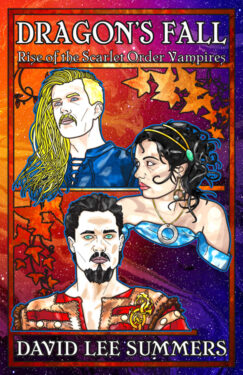by

Drawing the short straw is bad luck…isn’t it?
A treaty between three warring realms calls for a mass wedding ceremony amongst their eligible princes and princesses to solidify the peace. But since the number of males and females differ, one of the marriages must be between two of the princes.
Prince Obren of Canna draws the short straw, sealing his fate, and Prince Dukan of Butari volunteers to be the other half of the nontraditional marriage. The two princes fought nobly in the years-long war and are willing to do whatever it takes to finalize the treaty, ending the conflict that took the lives of their loved ones…Obren’s brother and Dukan’s lover.
Each harbors a dark secret, and King Rogan of Canna has long nurtured a deep hatred of Obren, blaming him for bringing home the deadly virus responsible for the untimely death of his much-adored wife. Obren and Dukan can’t deny their chemistry, but can they overcome the ugly truths complicating their path to a friendly, respectful, and—dare they hope—loving relationship? Will King Rogan stop at nothing to dash Obren’s chance at happiness, or does that short straw represent good luck, after all?
Publisher: JMS Books, LLC
Editors:
Cover Artists:
Genres:
Word Count: 25700
Setting: Fantasy Realms: Canna & Butari
Languages Available: English
Word Count: 25700
Setting: Fantasy Realms: Canna & Butari
Languages Available: English
Chapter 1: Drawing Straws
Obren, a prince of Canna, had drawn straws many times in the past, but never had the stakes been so high. This time it was not about who would go first or last either in childhood games of years gone by, or in sexual liaisons from more recent years. It was not about who would help pitch the army tents versus dig the holes for the latrine. Or fill them in, later, when breaking camp.
This time, the rest of his life was at stake. Not life or death itself, but the direction his life would follow and its potential to bring him happiness.
READ MOREObren’s stomach twisted into a knot as his father, King Rogan of Canna, offered his closed fist. Obren drew in a deep breath, understanding, to the marrow of his bones, that any plea to avoid this choice was pointless. A straw must be drawn, and as the older of the two brothers, he would draw first.
Not that the order of drawing mattered. Whether or not he drew the short straw would be down to luck. The luck of the draw would decide his life’s path. His hand twitched as he checked a nervous impulse to smooth down his already neatly styled blond hair.
Obren closed his eyes, shut out the sounds of his father’s heavy breathing, and focused on preventing the quiver building in his gut from reaching his hand as he lifted it. He paused and opened his eyes. Was there any possible stratagem he could employ to boost his chances?
“Just pick one,” Lale hissed. “Let’s get this over with.” Lale, being Obren’s younger brother, was as invested in the outcome as was Obren.
Obren swallowed, squared his shoulders, and snatched one of the two straws sticking up from Father’s fist. He stepped back and stared at the stick, but it gave him no information.
No useful information, anyway. Length could be both absolute and relative. He could see that the absolute length of his straw was about six knuckles long. But it was the length relative to the straw remaining in Father’s hand that would give the answer.
Lale strode swiftly forward and grabbed the remaining straw. The brothers stood staring at one another for ten solid beats before slowly raising their hands to compare straws.
Obren stared blankly at them, but it was the slow grin spreading across Lale’s face that came into focus first. Lale held the longer of the two.
Heat suffused Obren’s face as he snapped his straw in half and let the two pieces drop to the floor.
“Enough of that.” The king used his regal tone, usually reserved for court. “You will do your duty, and you will do it without displays that should have been left behind when you graduated out of the nursery.”
Obren clenched his jaw. He shouldn’t say anything more, but his mouth ran on unheeded. “I’m older. It wouldn’t have been out of order for you to have decided based upon our ages.”
“Your sisters are older still. You’re not even the spare, let alone the heir. You don’t matter.”
Lale snorted, and Obren shot a glare in his direction. But Lale was looking at their father with an unwise expression of disgust. The snort hadn’t been directed at Obren; it had been in response to Father’s unkind remark about both of their worth.
Obren softened his own expression, and when Lale returned his gaze to Obren, Lale swallowed, and said, “Obren’s right. Neither of us wants this, of course, but it should be me.”
The two brothers had never been the best of friends. Their personalities didn’t align well for that. But they’d always felt the bond of brotherhood, and here, Lale probably felt a sense of duty to repay Obren for saving his life amidst a fierce battle in the final year of the war.
Obren wasn’t entirely sure if his conscience would have allowed him to let Lale take this burden upon himself after winning the draw—probably not, impulsive comment notwithstanding—but that option wasn’t on the table.
“Nonsense. The selection was fairly made,” the king said with a glare of his own directed at Obren. “I expect you to behave like a rational adult at both the reunion dinner this evening and the ball tomorrow night.”
Obren held in his retort and gave a curt nod before turning on his heel and striding, with as much dignity as he could muster, from the room.
Anger roiled through his belly as he raced through the castle hallways to his suite of rooms. His footsteps clicked on the stone floor and echoed through the empty passages. A lingering whiff of the sausages they’d eaten at breakfast still hung in the air.
It was an understatement to say that Father preferred Lale. Had done since Obren had been a schoolboy. In fact, Obren wouldn’t be surprised to learn if Father had somehow manipulated the straws to ensure Obren picked the shorter of the two.
Father had never forgiven him for his mother’s death. As if Obren had deliberately caught the jumping spotty fever. He certainly hadn’t been aware enough during the height of his illness to influence his mother to stay away from him. She’d nursed him, as a loving mother would do, and she’d become ill herself, succumbing to the disease whereas Obren had recovered.
Once in his suite, he flopped face down onto the bed and screamed into his pillow.
Chapter 2: Oh, Dear
Some hours later, Obren’s personal servant, Zeko, tapped lightly, then opened the door to his chamber. “Lord Tomo Strugar and Lord Milun Lompar are here to see you, sir.”
Obren heaved himself to a sitting position and sighed. “Thank you, Zeko. Show them into my sitting room, please.”
“Will you require my assistance getting yourself in order, sir?”
Obren shook his head. “Thank you, Zeko. I’ll deal with it.”
With a nod, Zeko backed out and quietly snicked the door closed. Obren took a deep breath, slipped on his shoes, stood, strode to his dressing table, and gazed at himself in the mirror. His pale blond hair was now an untidy mess, but no more than he could repair himself with the help of a brush and without recalling Zeko to redo the plait at his nape.
He poured water from the pitcher into its basin and splashed some onto his face. After patting himself dry with a soft flannel, he straightened his shirtsleeves and waistcoat, fiddled with his neckcloth, and slipped into his jacket.
His best friends were already seated in his private sitting room when he entered from his bedchamber. He nodded to each in turn. “Tomo, Milun.”
“Were you in there pouting?” Milun asked in a tone a full octave higher than his natural voice. The tone he used to mimic his old nanny.
“Oh, stuff it.” Obren flopped heavily onto a large, soft chair. “I’m not in the mood.”
Tomo leaned forward with a mildly scrunched brow. “Want to tell us about it?”
Obren huffed. No amount of well-meaning advice would get him out of this situation, but at least he could get his grievances off his chest. “You know there’s a marriage agreement in the peace treaty, right?”
They both nodded, and Milun said, “Details haven’t come out, but yes, we know that much.”
“Truly, though,” Tomo said. “It’s not as if you were ever likely to marry for love. You’re a prince. Your father would have arranged a beneficial and diplomatic match regardless of this treaty.”
“We’re rungs below you,” Milun added. “And even we will at best have the power of veto when our parents decide they want to forge an alliance with another family, and we’d best use that power with discretion lest the next one they propose be worse and come with more pressure to assent.”
Obren waved a hand, dismissing their attempts to placate him. “I know that, of course, but listen. There are various ways they could have gone with this, but—” Obren snorted. “It was my father who insisted on this because he claimed Butari would get off unfairly easy otherwise.”
Milun cocked his head. “What are they doing?”
“You know, of course, that all three realms lost either sons or sons-in-law in the war.”
They both nodded. Canna had lost Pejo, Obren’s eldest brother, the former heir. They’d also lost his eldest sister, Jova’s, husband. Pretin had lost one of their younger princes, and Butari had lost their daughter’s husband.
“They want the marriages to happen now, with no delay to wait for the younger ones to grow up first, so they’re not being considered at all in the agreement.” The monarchs in Pretin and Butari both had children that fell into that category.
Tomo squinted. “So that leaves what? Four eligible for marriage in each of the realms.”
Milun shook his head. “But there’s an out-of-balance. Canna and Pretin have two each eligible men and women, but in Butari, it’s three men and one woman.”
“Right. Thus, my father’s insistence that it would be unfair if two men merely married noblewomen from the other realms rather than daughters of the monarch.”
“Got it,” Tomo said. “So only two from each realm must marry in the agreement, and you’re one of them?”
“I wish, but no. Father insisted that for a solid alliance, all of the eligible princes and princesses had to be included, and that means one prince from either Pretin or Canna must marry one of the princes of Butari.”
“Egad.” Tomo sat up straighter. “And you’re it?”
Milun leaned forward with widened eyes that didn’t quite reflect horror, but certainly expressed shock.
And who could blame him. It was a rather extreme solution to a situation that was neither nearly as unfair nor as weak as Father had made it out to be, so likely there were things left unsaid regarding his motivations.
Obren gave a tight nod. “Father lost a roll of the dice deciding whether Canna or Pretin would provide a son to marry one of the Princes of Butari, and I just drew the short straw to narrow it down between me and Lale.”
“A run of bad luck.” Milun scratched his head. “Another man is good for friendship and for sexual relations. I wouldn’t want to marry one.”
“Frankly…” Tomo scratched his head. “I’ve never considered it before. But other than the lack of offspring, would it really be so bad?”
Obren raised his hands, palms up. “That’s a rather important ‘other than,’ don’t you think? Yes, I knew I might or might not have ended up in a relationship with someone I could grow to care for, but I looked forward to raising children. Passing my skills down to my children.”
Much as Obren’s brother, Pejo, had done for Obren after Father’s essential abandonment of responsibility for his upbringing. After his illness, Obren had been left weaker than most men. By no means an invalid, but no longer a good candidate for sword-fighting.
Instead, he’d trained as an archer, and Pejo had also encouraged him to strengthen his skills with a slingshot. It was a skill everyone else left behind in childhood, but Pejo had said, “Even with resupply, you might run out of arrows, but you can usually find stones. And it’s no burden to tuck the slingshot into your waistband.”
That advice was how he’d saved Lale’s life during one memorable battle. He’d been temporarily cut off from resupply, but indeed, he’d found some stones.
Obren tightened his jaw. He would have passed those things on to all his sons, without favoritism, especially for things outside of their control.
“Well, yes, there is that.” Tomo sighed. “And I suppose you won’t have the best of both worlds anymore, but I don’t think it’s such a bad situation.”
Meaning sexual relations between men and women who weren’t a married couple was severely frowned upon, but when he married, he and his wife could have enjoyed relations together. Otherwise, men and women, whether single or married, could freely enjoy relations with others of their same sex.
And why not? There was no possibility of offspring to muddy the waters of parental lineage. Obren had no concerns about a physical relationship with another man. Not unless he actively disliked the fellow.
Milun heaved another overly dramatic sigh. “Nothing to do other than to make the best of it, I suppose.”
Tomo straightened again, and this time, warily narrowed his eyes. “Do you know which Butari brother you’re to marry? One of the younger two, obviously.”
Because clearly, it wouldn’t be Butari’s crown prince, and their princess was their spare. Obren lifted one shoulder in a halfhearted shrug. Then shot out of his chair as the reason for Tomo’s wariness finally occurred to him.
Of the two potential Butari princes, the younger of the two, Dukan, was known for having a clear preference for relations with men over women. Not that any of them experienced relations with the opposite sex outside of marriage, but one knew their own inclinations. Obren, like most, was attracted to both sexes.
Prince Dukan was known to have been in a years’ long serious—and as rumor had it, exclusive—relationship with Lord Vidan Faddy. It was said to have been a love relationship of the kind one hoped for in marriage. Not that they would ever have expected to unite in marriage.
Each would have married to strengthen political or business associations but would have continued their physical relationship alongside that. It happened all the time. In fact, Lord Faddy had been married.
That wouldn’t have concerned Obren at all. The two of them could be married, but they needn’t be exclusive as far as relations with other men went. If Prince Dukan wanted to focus his attentions on his relationship with Lord Faddy, Obren could find a lover of his own or could continue to get with whomever was handy and interested when the mood struck, as he did now.
He’d long ago accepted that a love match was unlikely for himself. As Tomo had said, he’d always been destined for an arranged marriage.
The problem was that Lord Vidan Faddy was the man Obren had killed with a stone from his slingshot as the man had been a fraction of a moment away from running his sword through Lale’s belly.
“Oh, dear,” Obren said. He paced to the fireplace and back. “Oh, dear,” he repeated.
“Oh, dear,” Milun echoed Obren’s words as a figurative candle lit over his head, and he, too, worked out Tomo’s concern. “But surely your father is aware of this.”
Indeed. Lale obviously knew, and therefore most likely, King Rogan did, too. Obren snorted indelicately. “Which means it probably is Prince Dukan.”
COLLAPSEButtonsMom2003 on Xtreme Delusions wrote:Excerpt from the review:
Luck of The Draw was a compact short story that focused on the success or failure of contractual marriage yet gave enough backstory for depth. It contained dancing, revenge, family relations, attempted murder, reflections on war and its aftermath – all amid a slowly unhinging monarch. The war and its aftermath proved that the pen is often mightier than the sword.
Maureen on Goodreads wrote:Excerpt from the review:
I loved how both Obren and Dukan were able to put aside bad things and proceed with the arrangement that neither of them specifically asked for. There’s a dark threat – secrets they are both keeping – and a twist that I didn’t see coming.
This was a great story; I really enjoy a well written novella!
Coffee ♡ on Amazon wrote:Excerpts from the review:
This novella is a quick read but packs a punch. ~~~ The ending twist is great.
Excerpt from a review on Amazon:
I’m giving this story full marks for creativity: the premise (a treaty that requires two princes to marry, with complications for the two grooms from a variety of sources) is super interesting, and the world building brings just enough depth and detail to bring the characters, who are dynamic and interesting in their own right, into focus. Dukan and Obren both have history , baggage, and reasons that make forging a healthy connection potentially challenging (gestures at the reasons you’d need a peace treaty in the first place), but they also have personalities that complement each other and a willingness to try to make things work, and that’s a good foundation for relationship building. This is a quick, immersive read.






